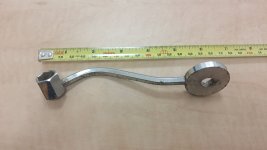dewcon4414
Bronze Member
- Mar 22, 2006
- 2,138
- 1,237
- 🏆 Honorable Mentions:
- 4
- Detector(s) used
- MDT, Nox, Blue Xcals and CTX
- Primary Interest:
- All Treasure Hunting
Ive got a good number of hours behind the wheel of the Xcal now hunting in PP with the advantage of reverse disc. For those using a PI and HAVE used the Xcal using reverse disc.... what kind of depth difference are you getting on say a clad dime.... since thats a consistent target? Im not looking for FISHERMANS TAPE measurements to justify what you are using. Give me some realistic guesses. I say guesses because i know depth out there is just that a guess. But .... if you have used both machines long enough to KNOW them id like to hear what you have to say on depth as well as a PIs SENSITIVITY to small gold over an Xcal here in Florida. Ive yet to get my hands on a PI to check targets and the work involved over a VLF. Yes i could jump out and buy one and do my own testing..... and may well have to. Its not about the money as much as changing my style for a just a small amount of depth and loosing the ability to cover a beach more quickly. Im also VERY happy with the Xcal.... but a PI is a different second machine to be used in the winter mostly.
Dew
Dew
Upvote
0


 .....once that deep sand rolls in, because we really don't want to start having to dig it all and we keep looking for a way not to despite what we already know.
.....once that deep sand rolls in, because we really don't want to start having to dig it all and we keep looking for a way not to despite what we already know.  Question is, will all the extra digging really be worth it? Only one way to find out to know for certain.
Question is, will all the extra digging really be worth it? Only one way to find out to know for certain.

